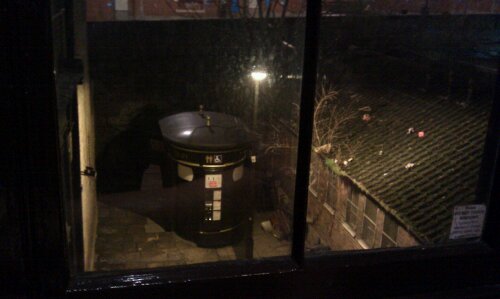 Now, the Frog in boiling water video uses an analogy. While he writes books instead of making videos, Cory Doctorow also works with analogies. In novels. That are free. It’s really too awesome to explain, check out his website and his other novels. I’m sure I’ll be coming back to his books in the future.
Now, the Frog in boiling water video uses an analogy. While he writes books instead of making videos, Cory Doctorow also works with analogies. In novels. That are free. It’s really too awesome to explain, check out his website and his other novels. I’m sure I’ll be coming back to his books in the future.
It’s an interesting way of explaining the relationship between value and money and how more money leads to inflation. Check out the book, the explanation is much longer than this.
“Sea-level” is a term that refers to the average level of all the world’s oceans. Think of the world as a giant bed-pan, filled halfway with water. You can blow on one part of the surface and induce some tiny waves whose crests are higher than the rest of the water. You can tip the bed-pan from side to side and cause the water to slosh around, making it higher at one end than another. But overall, there’s a single level to that water, a surface height that you can easily discern.
Same with the oceans. Though the tides may drag the water from one edge of the sea to the other — and really, there’s only one sea, a single, continuous jigsaw-puzzle-piece-shaped body of water that wraps around all the continents — though the storms may blow up waves here and there, in the end, there’s only so much water in the ocean, and it more or less comes to an easily agreed-upon height. Sea level.
Same with money. There’s only so much value in the world: only so much stuff to buy. If you got all the money in the world, you could exchange it for all the stuff on earth (at least all the stuff there is for sale). It doesn’t matter, really, whether the money is in dollars or gold pieces or mushrooms or ringgits or euros or yen. Add it all together and what you’ve got is the ocean. What you’ve got is sea level.
So what happens if someone just prints a lot more money? What happens if you just double the amount of money in circulation? Will the monetary seas rise, drowning the land?
No.
Printing more money doesn’t make more money. Printing more money is like measuring the ocean in liters instead of gallons. Converting 343 quintillion gallons of ocean into 1.6 sextillion liters (give or take) doesn’t give you any more water. Gallons and liters are measurements of water, not water itself.
And dollars are measures of value, not value itself. If you double the amount of currency in circulation, you double the price of everything on Earth. The amount of stuff is fixed, the amount of currency isn’t. That’s called inflation, and it can be savage.
The quote above is from his novel For the Win, that you totally have to read. It’s about the IWWWW, or Webblies. You can download it for free, and if you like it, donate a printed copy to a school or library! And of course the actual book makes a great present for your niece or nephew. For the Win is published under Creative Commons Attribution-Noncommercial-ShareAlike license
Read More